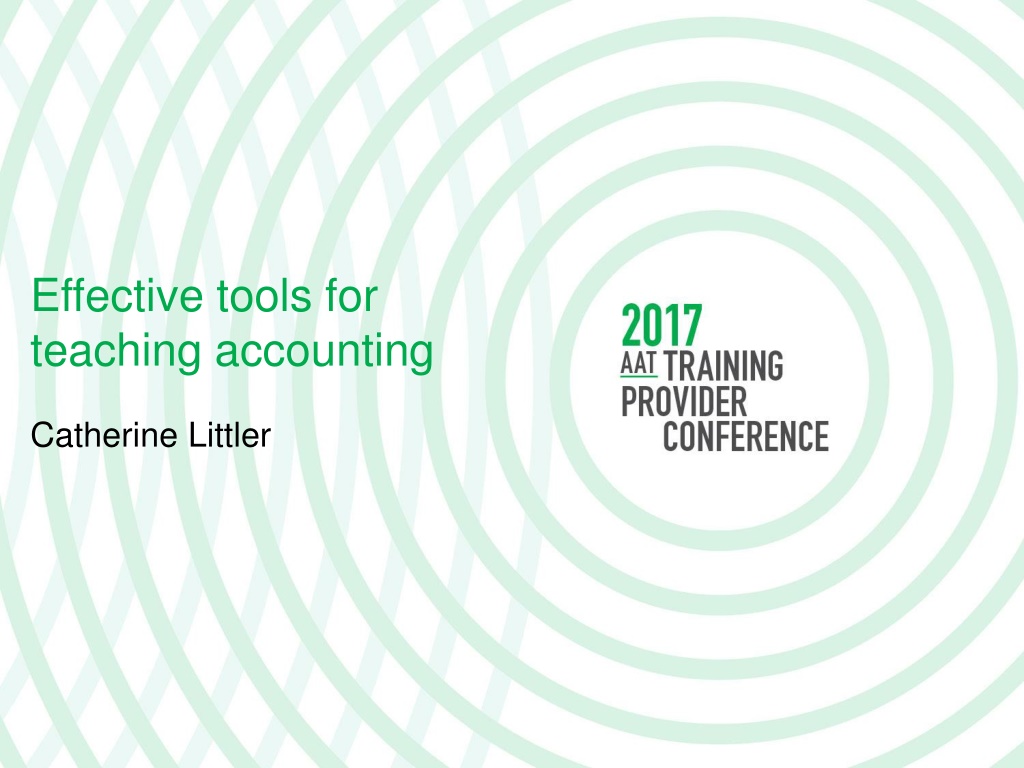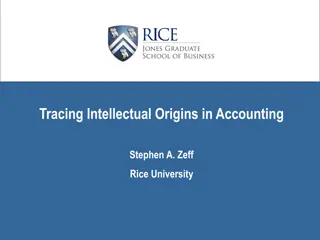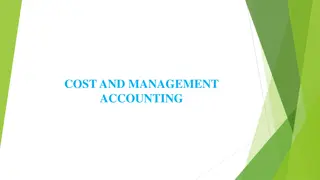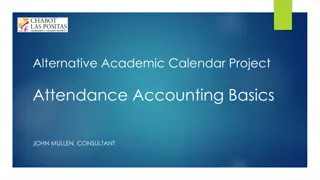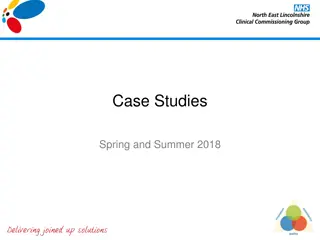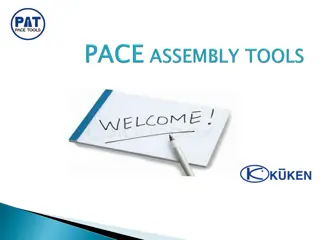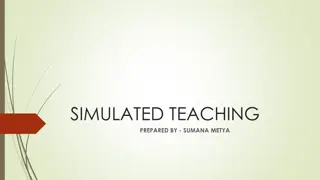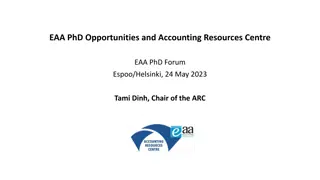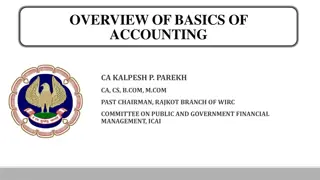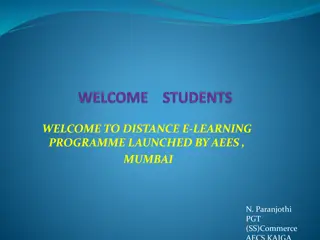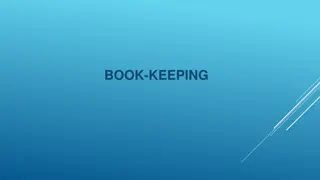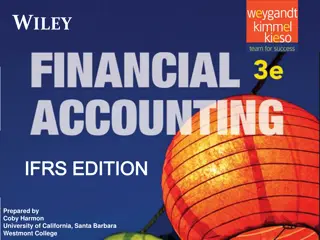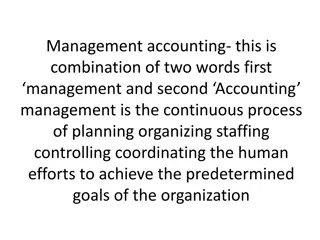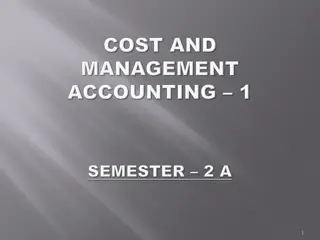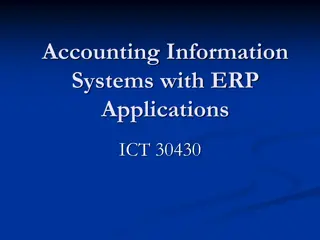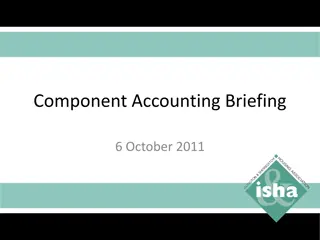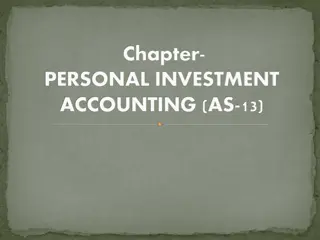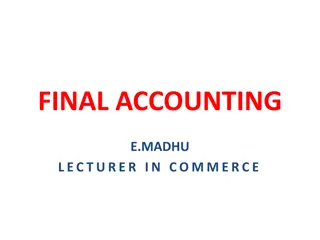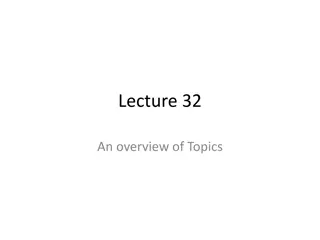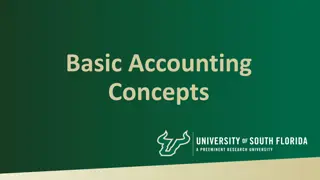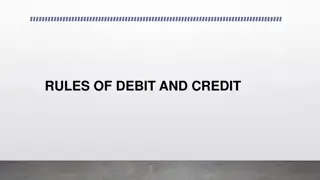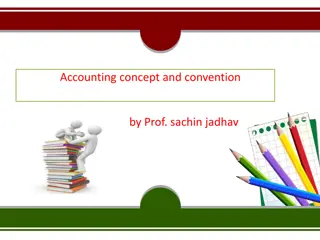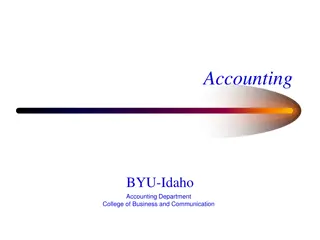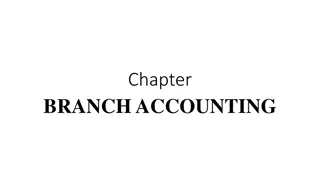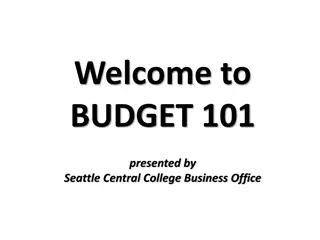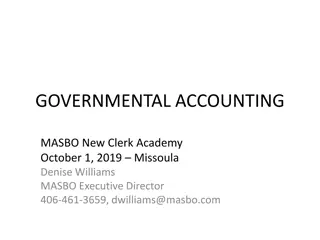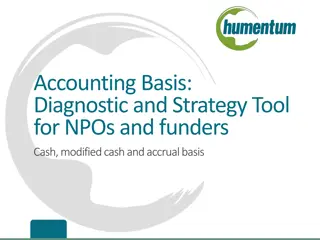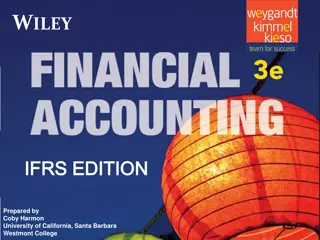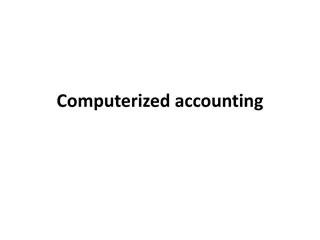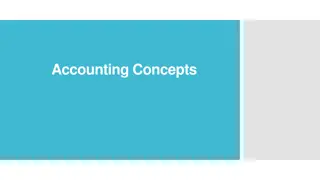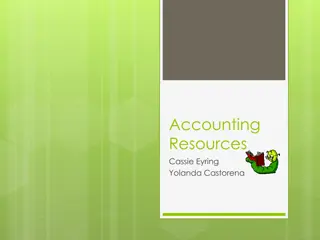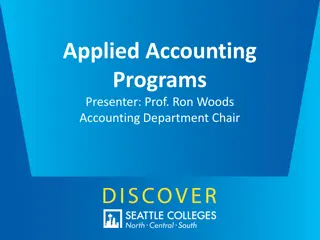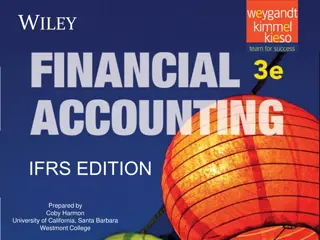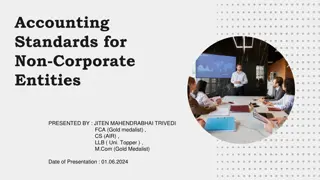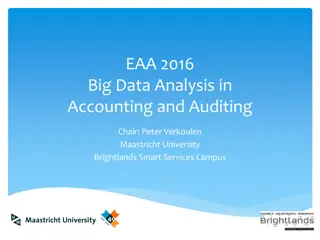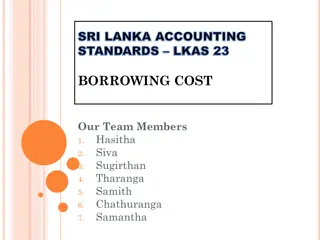Effective Tools for Teaching Accounting by Catherine Littler
Session aims to explore the effectiveness of traditional teaching tools in accounting, including technology, valuable classroom lessons, and reasoning tasks. The toolkit includes AAT specific textbooks, practice examples, and assessments. It emphasizes the importance of traditional methods for reasoning tasks like case studies, group discussions, and role play. The evolution of technology has brought changes in the classroom and industry, emphasizing the role of accountants as advisors. However, the basic principles of clear explanations, practice, and tutor feedback remain unchanged.
Download Presentation

Please find below an Image/Link to download the presentation.
The content on the website is provided AS IS for your information and personal use only. It may not be sold, licensed, or shared on other websites without obtaining consent from the author. Download presentation by click this link. If you encounter any issues during the download, it is possible that the publisher has removed the file from their server.
E N D
Presentation Transcript
Effective tools for teaching accounting Catherine Littler
Session Aims Traditional teaching tools 1 Technology, when is it effective? 2 Creating valuable classroom lessons 3 Tools for reasoning tasks 4
Traditional teaching toolkit AAT specific textbooks Practice examples calculations Practice assessments For most AAT students, this works well for knowledge, comprehension and application, in other words for reproduction tasks.
Traditional teaching toolkit AAT specific textbooks Practice examples calculations Practice assessments For most AAT students, this works well for knowledge, comprehension and application, in other words for reproduction tasks. Less effective where students need to be able to analyse, synthesise and evaluate for reasoning tasks.
Traditional methods for reasoning tasks Case studies, long or short Whole group discussions Small group work (with flipchart paper?) Role play
Traditional methods for reasoning tasks Case studies, long or short Whole group discussions Small group work (with flipchart paper?) Role play How effective are we at this? How much time do we devote to these methods compared to calculation practice?
What has changed? Largest change is technology, in the classroom and in industry (remember the accountant as an advisor). Computers, iPads & Smartphones E-Learning materials Remote lessons through internet webinars Remote access to traditional learning materials
What hasnt changed? The need for clear explanations The need to practice calculations and written work Tutor feedback on (written) work
How and when should we use technology? In my experience, and I suspect that of many other educators, the key is to recognise when technology adds value and when it doesn t. https://www.tes.com/news/further-education/breaking- views/a-quiet-digital-evolution-already-underway-fe Suzie Webb 6 Feb 2017
Using technology in teaching - Can computers replace classrooms? A computer can be hugely valuable for teaching independent learning, and it allows pupils to take greater control, but it can never respond to a class which fails to understand an issue and approach it in a different way. Accounting Technician Sept 2013
Using technology in teaching - Can computers replace classrooms? A computer can be hugely valuable for teaching independent learning, and it allows pupils to take greater control, but it can never respond to a class which fails to understand an issue and approach it in a different way. Accounting Technician Sept 2013 Computers are evolving and e-learning is becoming more sophisticated.
Studies have shown Some schools have invested heavily in IT but have had lower results; IT has to be used effectively. Searching the internet does not mean that the knowledge found is retained, perhaps because students often don t interact with the information.
Studies have shown Some schools have invested heavily in IT but have had lower results; IT has to be used effectively. Searching the internet does not mean that the knowledge found is retained, perhaps because students often don t interact with the information. Stronger neural pathways are formed using active learning and this must apply to all types of learning.
Basic technology tools Each of you will have different access to technology Most have smartboards of some description or projectors and some kind of computer. When you write on it, do you save and email to students? Can we use smartphones and computers in class for research, or for access to online textbooks or a provider online platform like Moodle?
Basic technology tools Each of you will have different access to technology Most have smartboards of some description or projectors and some kind of computer. When you write on it, do you save and email to students? Can we use smartphones and computers in class for research, or for access to online textbooks or a provider online platform like Moodle? There is a tendency to ban computers, phones etc. from class but is this realistic?
E-Discipline Fight against phone/computer misuse or accept it? There are packages available for computer rooms which can control student access to one programme or one website, but that only works on provider supplied computers. We can work on common politeness. We cannot stop misuse by students who are determined not to learn. We can work to make lessons valuable (from our very first lesson), creating the conditions that make students want to learn and get in the habit of giving us their attention.
Should we use technology in the classroom? How is it being used? Why is it being used? For each lesson, unit and course we should look at what we are trying to achieve and utilise the best methods for the students that we have. Technology must sit firmly within our toolbox as one of the many tools that we use depending on what is being taught and the needs of each group of learners.
Other technology tools for active learning Online forums and blogs AAT Facebook and AAT Comment Students use their own devices to work in Word/Excel rather than on paper.
Other technology tools for active learning Online forums and blogs AAT Facebook and AAT Comment Students use their own devices to work in Word/Excel rather than on paper. WEFN and ETFA searching for examples to discuss, using QR codes or airdropping (or similar) examples to other students or to the lecturer.
Other technology tools for active learning Online forums and blogs AAT Facebook and AAT Comment Students use their own devices to work in Word/Excel rather than on paper. WEFN and ETFA searching for examples to discuss, using QR codes or airdropping (or similar) examples to other students or to the lecturer. Polling software such as Socrative or Poll Everywhere Create flashcards for revision and share them in a shared online folder or similar.
So when does technology add value? To promote independent study for all levels and skills of learning. To present information in a different way and enhance active learning. When students and teachers cannot come together.
So when does technology add value? When it suits the student s learning preferences I am more comfortable asking questions online because no-one knows who I am, I find it embarrassing to ask questions in a classroom situation. It may not be everyone s learning style but I love the online lessons and being able to working at my own pace. In a classroom of students where we are all at different levels of understanding I wouldn t have the opportunity to concentrate on the areas I want to where I can online.
Apply the same learning methods to e-learning as to traditional learning I watch the videos through once, then switch on the subtitles and go through the video again, writing down the words and drawing the T accounts or whatever is on the screen. I like to watch the online lesson again the next day to go over everything again.
Apply the same learning methods to e-learning as to traditional learning I watch the videos through once, then switch on the subtitles and go through the video again, writing down the words and drawing the T accounts or whatever is on the screen. I like to watch the online lesson again the next day to go over everything again. Handwriting notes is more effective than typing notes. But typing notes is better than no notes.
When is technology ineffective? When students don t use effective learning methods. When it entertains but doesn t teach. When it doesn t hold the student s attention. When it distracts the students from their studies. When students don t complete their set tasks. When it is used to keep the students busy .
Where does this leave tutors? Distance numbers are increasing, but is it right for everyone? Technology is increasing access to good and poor online materials but do we know whether or not students are completing the work?
The tutor/lecturer as a motivator Many students need to be answerable to a tutor. Analytics for online studies show students increase their rate of study just before a lesson and long gaps between lessons mean long gaps between study periods. If there s no one to be answerable to, or the classroom lessons are not valued, there is an increased drop out rate.
Classroom lessons must be valuable The lessons with AA were brilliant she held everyone s attention throughout the class. The lessons with ZZ I find a waste of time to be honest. I can sit and do exercises alone at home so travelling to college to do it is annoying. It was very different with AA s classes and more worthwhile for me.
Classroom lessons must be valuable The lessons with AA were brilliant she held everyone s attention throughout the class. The lessons with ZZ I find a waste of time to be honest. I can sit and do exercises alone at home so travelling to college to do it is annoying. It was very different with AA s classes and more worthwhile for me. There is no point coming back after lunch for class, we won t miss anything.
Classroom lessons must be valuable The lessons with AA were brilliant she held everyone s attention throughout the class. The lessons with ZZ I find a waste of time to be honest. I can sit and do exercises alone at home so travelling to college to do it is annoying. It was very different with AA s classes and more worthwhile for me. There is no point coming back after lunch for class, we won t miss anything. We are our most valuable tool, how do we use this tool most effectively?
Ourselves as a tool Knowledge and experience
Ourselves as a tool Knowledge and experience Communication skills: simply telling students is ineffective, we must be creative in the ways we choose to communicate so that they hear us! do we hear what students are saying to us? sometimes tutors simply repeat themselves until the student understands or gives up?
Ourselves as a tool Knowledge and experience Communication skills: simply telling students is ineffective, we must be creative in the ways we choose to communicate so that they hear us! do we hear what students are saying to us? sometimes tutors simply repeat themselves until the student understands or gives up? Effective planning: considering the resources available choose the right tools for each session.
Increasing the range of our resources When we access a range of textbooks and resources for our lesson preparations then we may see things from a different perspective. AAT specific textbooks are written by writers who only have access to their own knowledge and experience and of the current syllabus they have no inside knowledge of the exams. Focus on the syllabus and draw your own conclusions.
Adding value to taught lessons Starter activities Have you been told to include these in observed lessons?
Adding value to taught lessons Starter activities Have you been told to include these in observed lessons? Are you delaying the start of the main part of the lesson as some students cannot arrive on time? Is your starter a warm up?
Adding value to taught lessons Starter activities Have you been told to include these in observed lessons? Are you delaying the start of the main part of the lesson as some students cannot arrive on time? Is your starter a warm up? Link to the last lesson? Focus on themes, perhaps a you should know this topic over a few lessons?
How valuable is your starter activity? A few multiple choice questions? An activity such as calculate an invoice? A quiz or memory test? Something more interactive? Does it promote discussion within the group and with yourself? What is it achieving can you achieve more with this valuable tool?
The main activities Presenting ideas and knowledge in a new way whether using e-learning or using a range of other classroom activities helps understanding. Students need to practice, but can more of the practice be done in their own time? Can we focus the classroom practice on difficult work, like posting day books rather than completing them?
The main activities Presenting ideas and knowledge in a new way whether using e-learning or using a range of other classroom activities helps understanding Students need to practice, but can more of the practice be done in their own time? Can we focus the classroom practice on difficult work, like posting day books rather than completing them? What can you do as a tutor to make your lessons more valuable, what tools will you choose to use?
What activities have we discarded (or never attempted) that students value? Student led activities are important for understanding. Interactive activities blended with practice examples increase the value of the lesson.
What activities have we discarded (or never attempted) that students value? Student led activities are important for understanding. Interactive activities blended with practice examples increase the value of the lesson. I took your cards, sorted them into the categories and pinned them to a board in my room. I looked at them every morning and evening and it really helped me.
Forming partnerships a student led activity Ask the students to set up their own partnership, agreeing profit sharing ratios, how much capital they are going to invest and agree interest on capital and salaries. Do some year end calculations. Make a partner leave a group and then join another group, including goodwill for each change of partnership.
Why does this partnership activity work? The role play required to form the partnership gives understanding of partnership agreements there is a realism about the actions and figures agreed by the students as opposed to figures given to students by a teacher or online. Students report that they find it useful as it brings together all the aspects of the section of the syllabus and improves understanding.
Promoting theoretical knowledge We must understand that what is obvious to us is not obvious to the students: cheaper raw materials may be of a poorer quality cheaper workers may be less skilled workers skills improve with practice so production speed of a new product will increase over time. Telling the students these points will not work we need to use a tool that encourages active engagement.
Preparing for reasoning tasks Deduction Problem solving Articulation
Deduction Slow down the calculations and predict the effect that the results may have on the business. Small and large case studies, what if.. aim to facilitate student exploration of outcomes. Particularly suited to Management accounting.
Giving students thinking time Give the students a calculation, for example to work out the amount of overhead to be absorbed into a product. Normally we would then have a quick discussion, perhaps telling the students the theoretical applications and then move onto another question. Instead, turn the question into a scenario by moving on in time and perhaps doing an actual or what if calculation. Develop the scenario further, re-calculating but with more emphasis on the outcomes.
